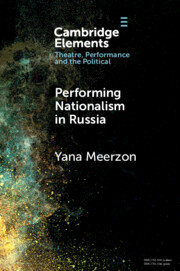Element contents
Performing Nationalism in Russia
Published online by Cambridge University Press: 08 February 2024
Summary
- Type
- Element
- Information
- Online ISBN: 9781009451949Publisher: Cambridge University PressPrint publication: 29 February 2024
References
- 7
- Cited by

